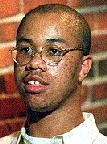 Donnell Johnson On October 31, 1994, nine-year-old Jermaine Goffigan was shot to death outside of his grandmother's apartment in Boston, on his birthday. He was in a crowd of people counting the candy they had received on Halloween when two men approached and fired randomly into the crowd.
The family of the boy gave a description of the shooter that matched Donnell Johnson, a sixteen year old who lived in a nearby project, though they acknowledged the lighting was poor at the time of the shooting and that both men were wearing hoods. They then identified Johnson by photograph and subsequently in a lineup. One witness, however, was unable to identify Johnson in the lineup.
Police believed that the shooting was a retaliatory gang-related slaying aimed at other youths. Though they were aware of other suspects, Johnson was arrested and charged with first degree murder on November 1, 1994, the day after the shooting. The main items of evidence against Johnson were the three eyewitness identifications. At trial the victim's mother and brother and another man who had been at the scene all identified Johnson. Johnson consistently maintained that he was at home watching football at the time of the shooting. His mother and grandmother corroborated the alibi.
Massachusetts juvenile court rules provided that a juvenile charged with a serious felony be tried first by a judge, and then, if convicted, could request a new trial before a jury. On March 27, 1996 Johnson was convicted of first degree murder by a judge in Suffolk County Juvenile Court. He was retried by a jury, convicted on November 27, 1996, and sentenced to 18-20 years in prison.
Johnson appealed based on misconduct by prosecutors and police: Detective William Mahoney had testified falsely that Johnson refused to be interviewed, and prosecutors had failed to produce the records of the original interview with Johnson until the middle of the second trial. These records showed that Johnson did talk to Mahoney and Detective Daniel Keeler and had given an alibi immediately. The Supreme Judicial Court of Massachusetts upheld the conviction in 1998.
On November 23, 1999 Johnson was released after evidence pointing to another suspect surfaced. In the course of an unrelated federal drug investigation, a gang member made a deal with prosecutors and told authorities that Johnson was not the real killer. Instead he identified two other fellow gang members as the shooters. One of these men resembled Johnson when they were both 16. On March 28, 2000 prosecutors dismissed the charges against Johnson in Suffolk County Juvenile Court after their investigations convinced them that he was not involved. Johnson later filed a lawsuit seeking compensation from the state of Massachusetts. The lawsuit was settled for $500,000.
In May 2001 two other men, Michael Brown and Bennie Santos, were indicted and arrested for the murder of Jermaine Goffigan. On August 3, 2004 they pled guilty to involuntary manslaughter.
Detective Mahoney was subsequently suspended for 30 days without pay for his actions in Johnson's case. Mahoney also was involved in the wrongful conviction of James Lucien, who was exonerated in 2021.
The corrupt activities of another detective, John Brazil, contributed to Lucien's wrongful conviction as well as the wrongful conviction of Sean Ellis, who was convicted in 1993 and exonerated in 2018.
—Michael S. Perry
|